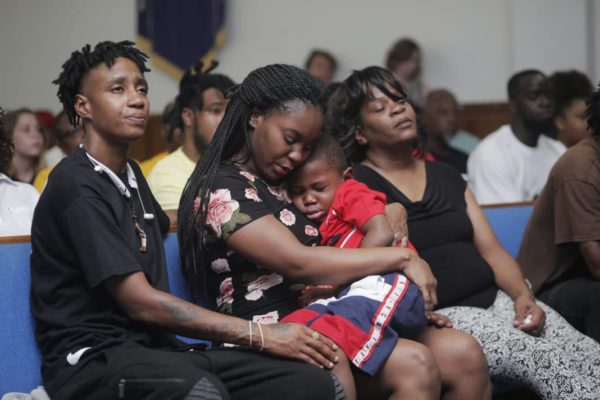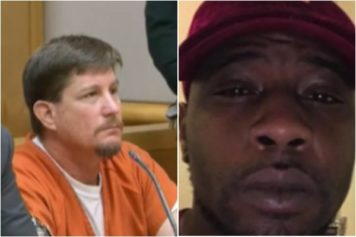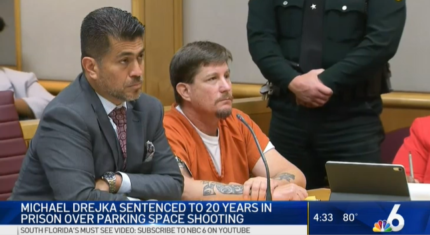ORLANDO, Fla. (AP) — A dispute last week over a handicapped parking space quickly escalated into a fatal shooting and now the dead man’s family is outraged that the gunman has avoided arrest, seemingly protected by Florida’s controversial “stand your ground” law.
The family of Markeis McGlockton issued an appeal Tuesday for the public to put pressure on State Attorney Bernie McCabe to file charges against Michael Drejka, a white man who fatally shot the black father of three last Thursday upon being pushed to the ground outside a Clearwater, Florida, convenience store.
“Mr. Drejka is walking around the streets of Clearwater free as a bird,” Michele Rayner, an attorney for McGlockton’s family, said at a news conference. “This is essentially murder, plain and simple.”
Pinellas County Sheriff Bob Gualtieri last week announced he wasn’t going to arrest Drejka and said the State Attorney’s Office will make a decision on charges.
Drejka confronted McGlockton’s girlfriend about parking in a handicapped space without a permit while she waited in a car outside a convenience store, telling her to move her “f—— car,” the girlfriend, Britany Jacobs, said Tuesday at the news conference.

In this Sunday, July 22, 2018 photo, Britany Jacobs, 25, consoles her 5-year-old son Markeis McGlockton Jr., during a vigil for his slain father Markeis McGlockton Sr., 28, while their cousin Mesha Gilbert, 26, left, looks on at Mt. Carmel Baptist Church in Clearwater, Fla. (Octavio Jones/Tampa Bay Times via AP)
After exiting the store and seeing the argument, McGlockton shoved Drejka to the ground, and Drejka pulled out his gun. Seconds later, Drejka shot McGlockton in the torso, according to surveillance video from the store.
The case fell under Florida’s controversial “stand your ground” law, which allows people to use force without retreating if they feel threatened, the sheriff said.
“I’m not saying I agree with it, but I don’t make that call,” Gualtieri said at a news conference last Friday.
The few seconds between when Drejka hit the ground and fired the shot “gives me pause,” the sheriff said.
But Rayner said McGlockton was merely protecting his girlfriend and two children who were in the car when he shoved Drejka and that McGlockton posed no imminent threat to the shooter. McGlockton was backing away when he was shot in the side, she said.
“There is going to be a lot of conversation … about the ‘stand your ground’ law and the problems with the ‘stand your ground’ law, how it disproportionately does not benefit people of color, how there are too many nuances in the law and it’s too loosely applied,” Rayner said. “Ultimately, this case isn’t ‘stand your ground.'”
Some legal experts, though, said Tuesday that the case is a classic example of the “stand your ground” law. The often racially-charged statute gained national prominence in 2012 after neighborhood watch captain George Zimmerman fatally shot unarmed black teenager Trayvon Martin, claiming self-defense. Zimmerman, a white Hispanic, ended up waiving his right to a self-defense immunity hearing and was acquitted of criminal charges at trial.
Nova Southeastern University law professor Shahabudeen Khan said Drejka could have felt threatened while on the ground.
“The key issue that would help the gunman, it’s the physical position on the ground he is in because of that initial push,” Khan said. “He fell on the ground. He is in a weak physical position and posture even if there is a few-second pause.”
Added Khan, “The law allows him to do exactly what he did. That is stand your ground.”
For the past 13 years, Florida’s “stand your ground” law has eliminated a citizen’s duty to retreat before using deadly force in responding to an apparent threat. A change to the law last year switched the burden of proof from defense attorneys making a case for it to prosecutors having to disprove the self-defense claim.
Jacobs, who has three children with McGlockton, and his parents described him as a family man who liked to rap and draw.
“He didn’t have to go like this! He didn’t have to go like this!” she said.


